Live Bay Area and California Election 2022 Updates
Follow KQED reporters as they cover election results from across California and the Bay Area throughout Tuesday evening and beyond.
So Long and Thanks for Reading/Listening/Watching/Tweeting/Tik-Tokking/Hanging Out ...
This is it, folks. Last call! One more brewski before you catch BART, or Muni, or whatever technological whizbang invention comes along to replace Lyft one day (seriously, watch it be ride-hail unicycles), outta this digital joint.
In short, this live blog is done.
But your humble writer (Joe Fitz, here, hello!) wants to thank you for joining us in our new election venture.
This live blog gizmo is new for us here at KQED News, and while we've got some bits and bobs to smooth over, and some kinks to iron out, we had a grand time bringing you the latest results from elections across the Bay Area, and California.
The beauty of this venture, though, is it was a team effort. I wanted to take a second to highlight the sheer breadth of involvement to bring this all to you. A peek behind the curtain, if you will?
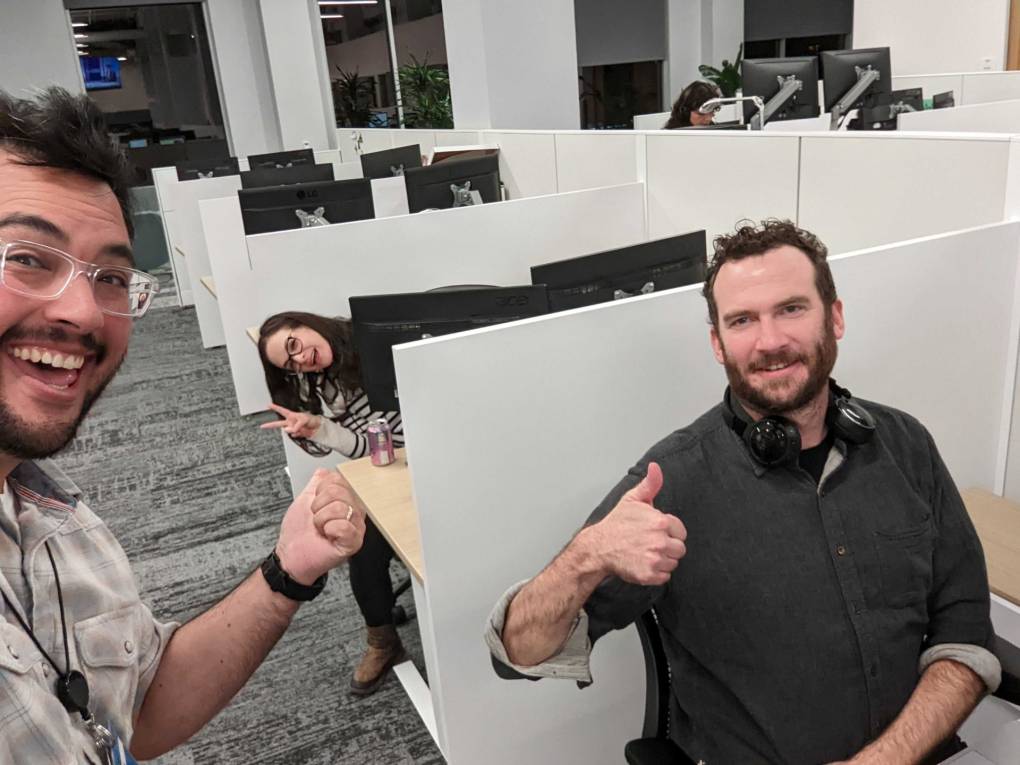
Just this election live blog alone required writers like myself, alongside reporters Emma Silvers, Dan Brekke, editors David Marks and Attila Pelit, and copy editor Jenny Pritchett, tied to our computers (and sometimes phones!) to keep it fed with updates.
Then a small fleet of reporters, from Annelise Finney, Carlos Cabrera-Lomeli and Tyche Hendricks to Adhiti Bandlamudi, and far more, to feed it with information from election gatherings across the Bay Area. Photographers Beth LaBerge and Aryk Copley captured many of the images you see on the blogroll and the website's posts. And developers Sahila Jorapur and Kimberly Low crafted the live blog itself — without them, I couldn't type this to you now.
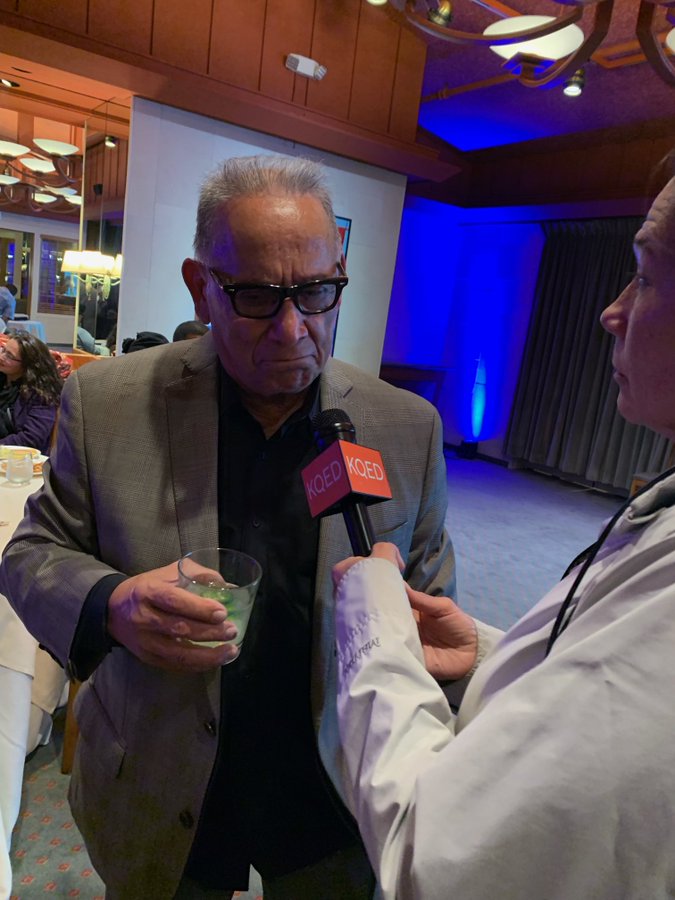
All of those resources came to bear to bring you up-to-date information here on KQED.org, but also so many other KQED platforms previewed the election or covered it in real-time, that it's hard to name them all (I'm sure I'll forget one!): The engagement team, including Carly Severn, Jasmine Garnett, Anna Vignet and Maria Pena brought you updates on Twitter, Facebook, Instagram, by email and Tik-Tok.
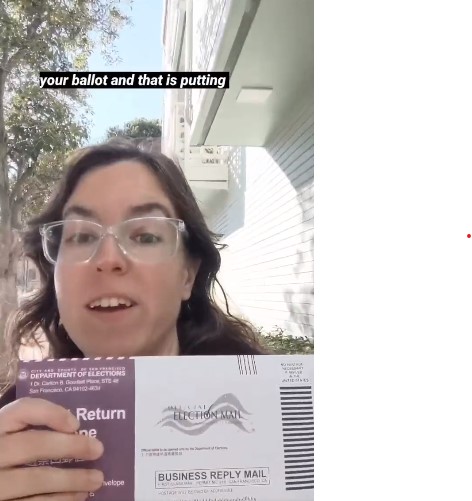
Podcasts like Bay Curious and The Bay brought ballot and candidate information to your ears, and Politics and Government Editor Scott Shafer alongside Politics and Government Correspondent Marisa Lagos brought their analysis over the radio airwaves at 88.5 FM, which can also be heard on a live stream. KQED Newsroom host Priya David Clemens broke down election issues in the weeks leading up to that fateful night.
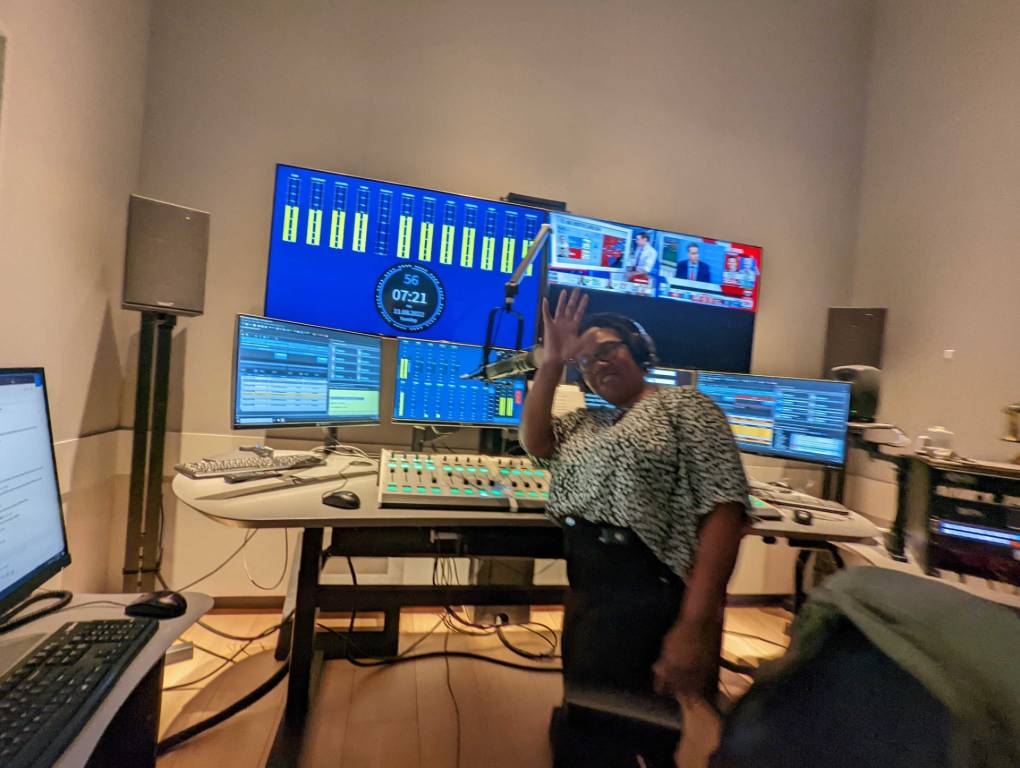
A bevy of engineers and technical wizards help make all of the radio, web and television content actually work, too.
And, of course, folks had to organize all of this madness: Politics reporter Guy Marzorati made much of this happen with his grand vision, alongside the editorial talents of Ki Sung, Otis R. Taylor Jr., and Ethan Toven-Lindsey.
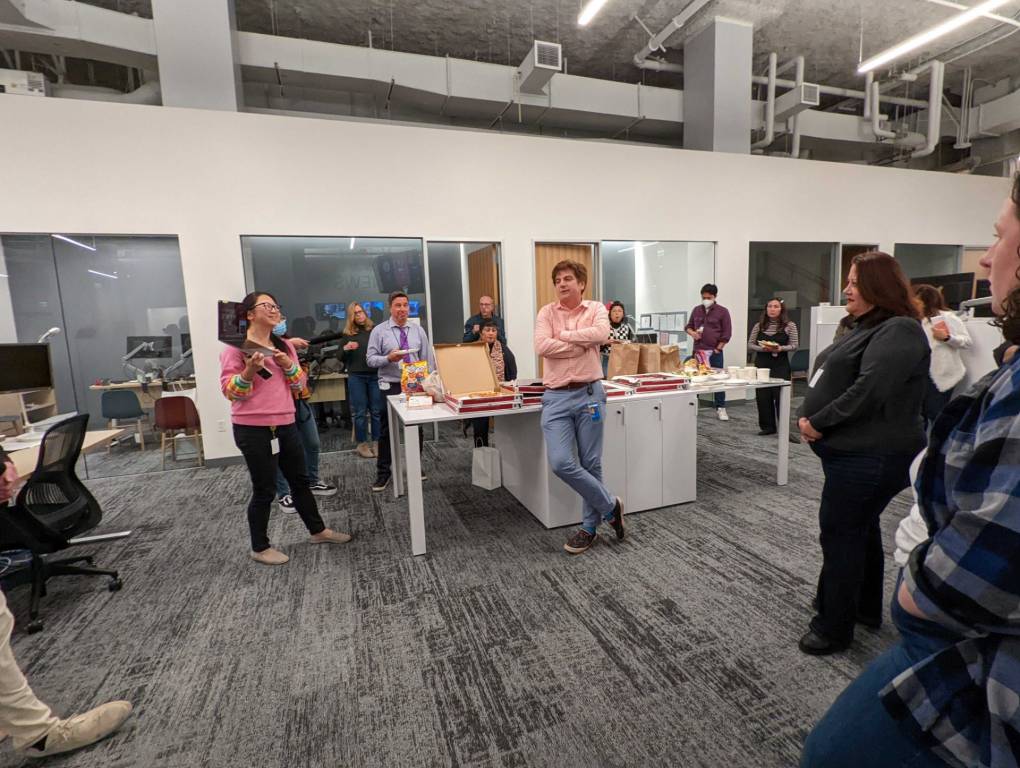
So why go through all these names, this rigamarole? Why show you photos of our election night pizza?
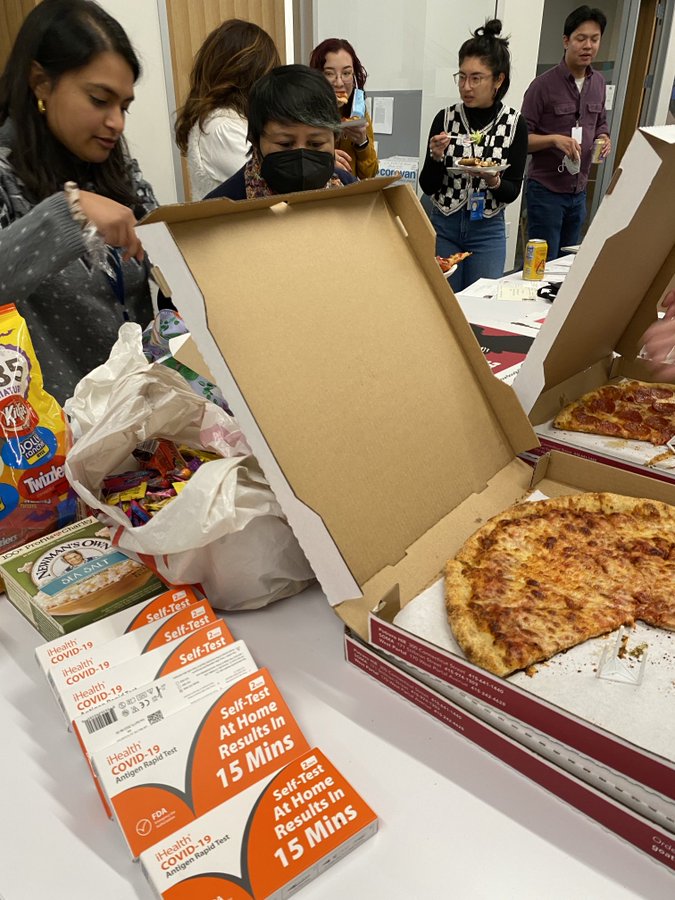
Well, it's not just to give a round of applause for my colleagues, though that's certainly a part of it. It's really about transparency.
Research from the Pew Research Center shows the public trusts individual journalists more than media organizations themselves.
And today, trust is a scarce commodity.
With the stakes so high in this election — and seemingly every subsequent election, these days — it's more important than ever to show you that KQED is not just a place, not just an institution, not just a logo with a familiar styling. It's people.
We live in San Francisco, in Oakland, in the North Bay, on the Peninsula and beyond. We are your neighbors — these elections affect us, too. And many of us bring you these election results, and subsequent analyses, out of a sense of duty to our community.
To you.
We hope we've done our jobs well. And if not? Leave us a message and tell us what you'd like to see more of.
There's always next year.
In Alameda County DA Race, Wiley Ally Decries the 'Chesa Boudin Experiment'
It wasn't just San Francisco that dealt with the specter of former District Attorney Chesa Boudin.
That particular Ghost of Elections Past also rankled chains throughout the Alameda County district attorney's race to replace outgoing DA Nancy O'Malley — even at candidate Terry Wiley's campaign party last night.
"The Chesa Boudin experiment was tried in San Francisco and it failed," Deputy District Attorney Butch Ford told the crowd, as heard by KQED reporter Annelise Finney, referring to the appointment of a progressive DA. Ford continued, "So Terry Wiley made it real clear he'd be damned that the 'Pamela Price experiment' be tried here."
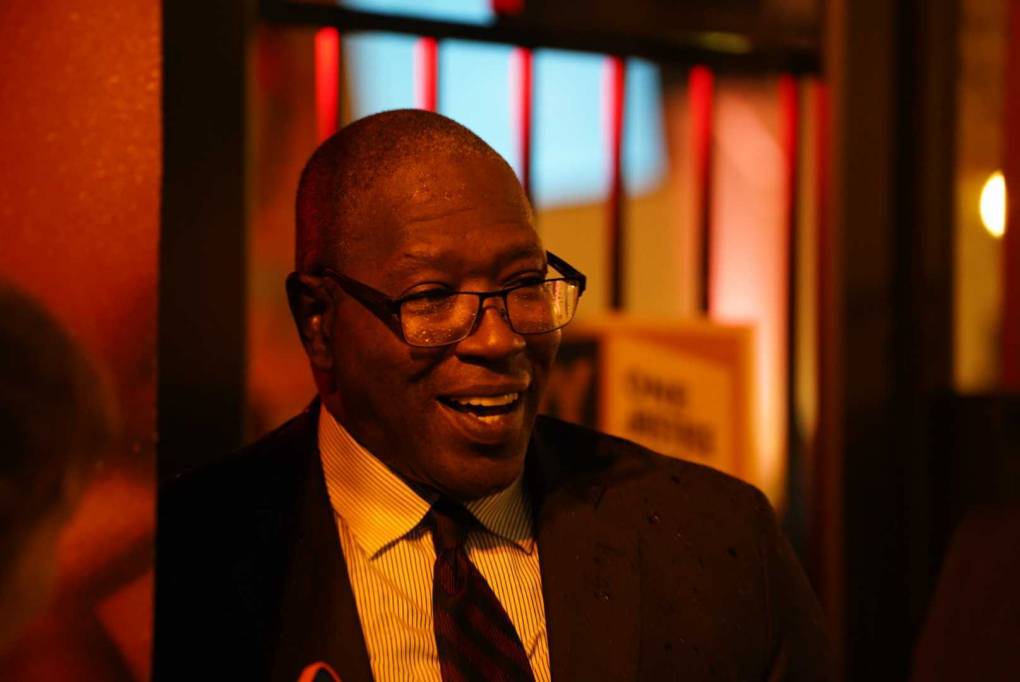
Price, who is running as a progressive to Wiley's political left, has faced this kind of criticism throughout the campaign.
As reported by East Bay Insiders journalist Steven Tavares in August, Price said the chief difference between San Francisco and Alameda County was the united front of the Asian American community coming together to trounce Boudin in last June's unprecedented recall.
“We’re not going to suddenly become San Francisco,” Price said, according to Tavares.
San Francisco or not, Wiley leads in the Alameda County DA race, 52% to Price's 48%. There are 250,000-450,000 ballots left to be counted, with the next update coming from the county on Thursday.
Mahan Keeps Slim Lead Over Chavez in San Jose Mayor's Race
If you're biting your nails over the narrow lead City Councilmember Matt Mahan holds over Santa Clara County Supervisor Cindy Chavez, sorry to tell you — your nails are about to get shorter.
Wednesday's late-afternoon ballot count in the San Jose mayor's race added just 6,384 new ballots to the pile. And the four-point gap between the two candidates didn't budge an inch.
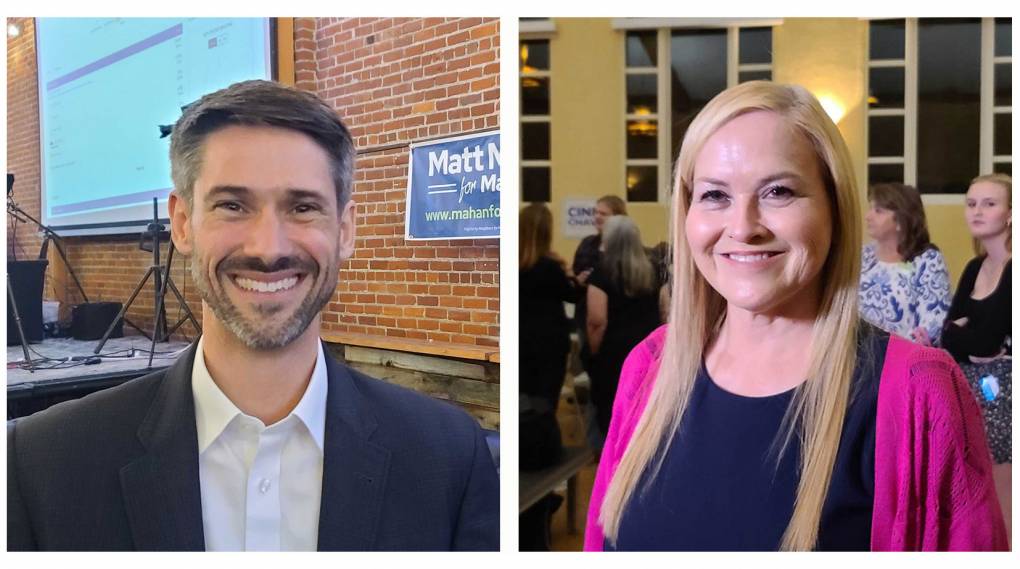
Speaking to KQED's Carlos Cabrera-Lomelí at her election party on Tuesday night, Chavez said, “I love public service, and I will spend my whole life in it, one way or another.”
If that four-point lead of Mahan's doesn't change, it looks like it'll be "another."
Santa Clara County's next ballot update is scheduled for Thursday at 5 p.m.
Proponents of a Car-Free JFK Say San Francisco Voters Clearly Want Fewer Car-Centric Spaces in Their Future
San Francisco voters heavily rejected a ballot proposition to return cars to JFK Drive in Golden Gate Park, and also to the Great Highway, ballot counts revealed Tuesday night.
The 60-40 margin against Proposition I didn't so much slam the brakes on returning cars to the popular thoroughfare as show San Francisco voters wrenching the proposition's proverbial steering wheel far to one side, sending it careening into a ditch.
Now, pedestrians, cyclists and those oh-so-stylish weekend roller skaters will glide across streets at the foot of the California Academy of Sciences and the de Young Museum once again. (And maybe they'll sing this song while they skate.)
Opponents of the road closures have said they limit access to Golden Gate Park and Ocean Beach for people with disabilities, while forcing traffic onto neighboring streets.
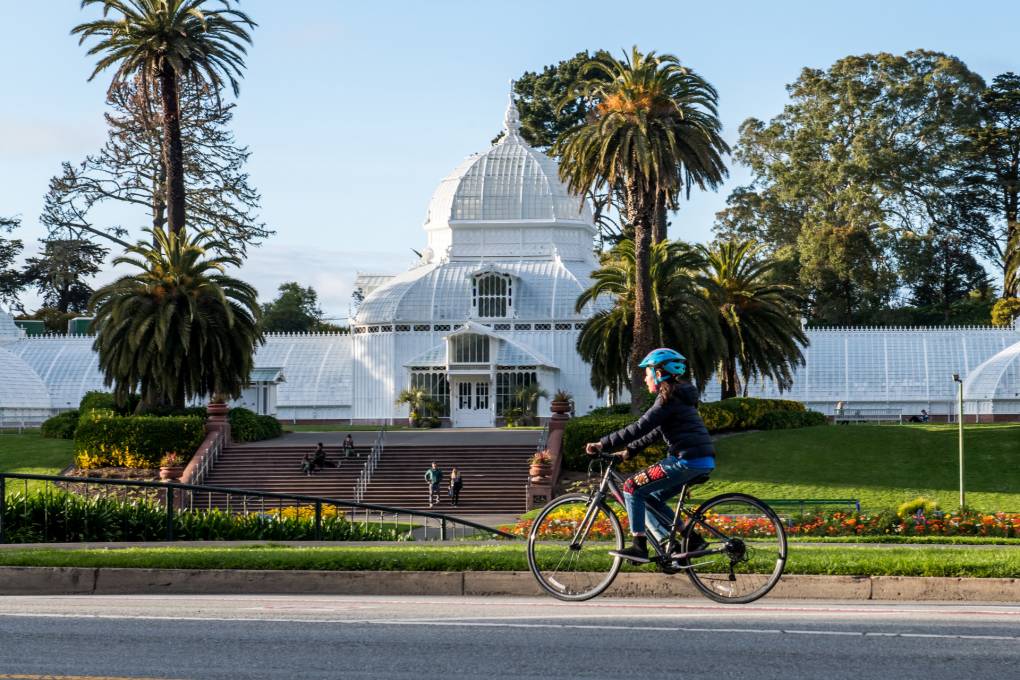
Proponents of Proposition J, a competing measure to enshrine car-free streets on JFK drive (which, in a flip, enjoyed a 60-40 win), say this is only the beginning. The positively huge margins of their win portend more car-free streets in the future, they told KQED News editor Sara Gaiser.
"Voters have sent a clear message that they want to see the city do more on sustainable transportation and car-free and car-light spaces," said Luke Bornheimer, an organizer and advocate for Prop. J.
What those spaces looks like is up to San Franciscans, he said, but we've already started to see organizing around some of those newfangled streets.
A 24/7 "Great Highway Park" may be a new target for advocacy, or more "slow streets" with barriers discouraging through-traffic so people can walk more freely in their neighborhoods.
"I think that's what voters want to see. And they're looking to our leaders and elected officials to get to work on making that a reality," Bornheimer said.
Hamasaki Campaign on Jenkins' SF DA Victory Declaration: 'We Respect the Results'
The numbers appeared to show a clear win for San Francisco District Attorney Brooke Jenkins last night. And with little haste, she declared victory in her campaign to retain her seat this afternoon.
But the campaign for John Hamasaki has, since last night, remained rather mum on the finality of the results.
Now we've learned that Hamasaki, Jenkins' progressive challenger, and next-top vote-getter, will issue an official statement tomorrow morning.

His campaign manager, Kaylah Williams May, told KQED that in the meantime, "We respect the results that are coming in. John and I and our team are incredibly proud of what we've done. Especially when you see the first-round ballots for Brooke were less than 50%.
"In the short, less than 100-day campaign we ran, we had that much of an impact. It really shows San Franciscans were ready for an independent district attorney. We're waiting to see where all the districts fall and will have a statement tomorrow morning."
In San Francisco, 158,200 ballots have been counted. Votes remaining to be counted are in the range of 106,000-212,000. The next update from the registrar is expected at 4 p.m. Thursday.
For more, check out our full story on Jenkins' declaration of victory.
State of the Vote Count
You say you want to know all the winners and losers from Tuesday's election. So do we.
But in our current vote-counting environment, there's only one thing we can tell you for sure on election night and the day after that … and the day after that: Be patient. This is going to take a while.
We won't dwell on why vote-counting takes so long now — it mostly has to do with the prevalence of mail-in ballots, the fact that so many of those come in late in the process, and how time-consuming it is for election officials to count them.
Instead, here's a quick rundown of when you can expect the next round of results — but not the final results — from Bay Area election offices. We're including an estimated range for the number of ballots remaining to be processed in each county based on total registration and the turnout in the last two midterm elections, 2014 (a low turnout year) and 2018 (a high turnout year). You can check our arithmetic here.
Alameda County: 170,452 ballots counted. Votes to be counted: 250,000-450,000. Next update: Thursday, November 10.
Contra Costa County: 229,444 ballots counted. Votes to be counted: 115,000-245,000. Next update: 5 p.m. Thursday, November 10.
Marin County: 46,895 ballots counted. Votes to be counted: 56,000-90,000. Next update: Thursday, November 10.
Napa County: 21,943 ballots counted. Votes to be counted: 23,000-39,000. Next update: Monday, November 14.
San Francisco: 158,200 ballots counted. Votes to be counted: 106,000-212,000. Next update: 4 p.m. Thursday, November 10.
San Mateo County: 122,135 ballots counted. Votes to be counted: 78,000-192,000. Next update: Before 4:30 p.m. Thursday, November 10.
Santa Clara County: 293,148 ballots counted. Votes to be counted: 215,000-420,000. Next results: By 5 p.m. Wednesday, November 9.
Solano County: 73,842 ballots counted. Votes to be counted: 45,000-93,000. Next update: End of day Wednesday, November 9.
Sonoma County: 100,523 ballots counted. Votes to be counted: 82,000-137,000. Next update: Friday, November 11.
SF District Attorney Brooke Jenkins Declares Victory
San Francisco District Attorney Brooke Jenkins, who built a big lead over opponents John Hamasaki and Joe Alioto Veronese in election night returns, issued a short statement early Wednesday afternoon:
“I extend my thanks and gratitude to the voters of San Francisco for placing their trust in me to serve as District Attorney. It is an honor of a lifetime to be elected and I pledge that improving and promoting public safety will be my and our office’s top priority. "
Jenkins' declaration comes with most of the San Francisco vote still uncounted. She's racked up 48% of the vote to 34.1% for Hamasaki and 13.1% for Veronese. After vote transfers in a preliminary ranked-choice voting "instant runoff," Jenkins' edge over Hamasaki stands at 56.3% to 43.7%.
Depending on the total number of votes cast Tuesday — a number that remains unknown — election officials could have another 200,000 ballots to count in the race.
Santa Clara County: Palo Alto's Former Top Cop Leading Race for Sheriff
Former Palo Alto Police Chief Bob Jonsen is leading the race for Santa Clara County sheriff, outpacing former sheriff’s Capt. Kevin Jensen 51.4% to 48.5%.
In interviews Wednesday morning, both candidates said they're ready for a long wait for final returns. County election officials estimate that 49% of ballots cast in the election have been counted.
“I’m excited," Jonsen said. "I’m optimistic the returns will keep going in my direction, but I’m cautious that there are still a lot of votes to be counted.”
“I appreciate the fact that we’re close,” he added. “I’d like the totals to be much more in my favor right now, but I fought an uphill battle with the name similarities.”
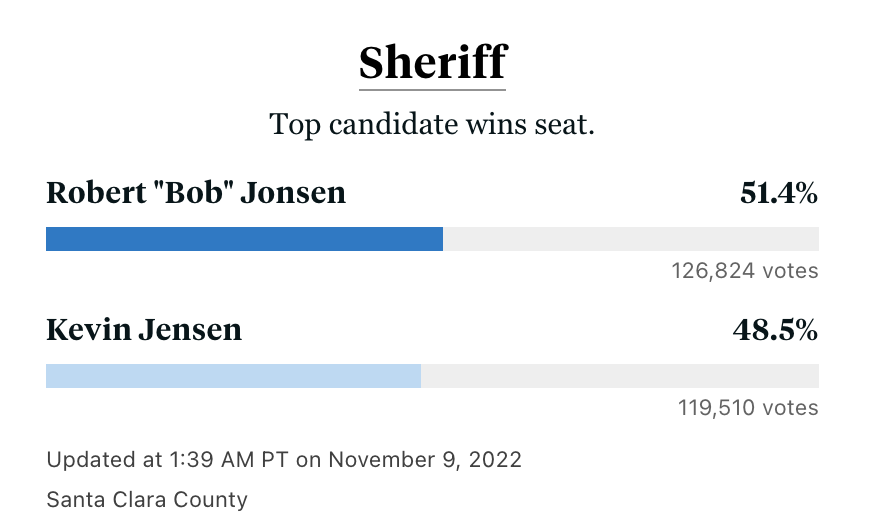
Santa Clara County voters are choosing a new sheriff for the first time since 1998, when Laurie Smith became the first woman to win the position in California history.
Smith, who did not seek reelection, resigned last month, days before she was convicted on a half-dozen civil corruption charges related to campaign finance violations, the distribution of concealed weapons permits, and the handling of internal investigations into the treatment of mentally ill incarcerated people in county jails.
Both Jensen on Jonsen vowed to bring change to an office beset by scandal.
Jonsen said he would bring an outside perspective to the sheriff's office and prioritize community engagement, while Jensen said his long tenure with the department positioned him well to enact reforms with deputy support.
Early vote results show Jonsen winning support in the county’s more affluent and progressive suburbs from Los Altos to Mountain View, with Jensen running ahead in southern county precincts, from south San Jose to Gilroy.
Berkeley: BART Housing at Center of Close City Council Race
The only seriously contested race on Berkeley's City Council ballot centers on the fractious local politics around housing policy.
In the District 1 City Council race, one-term incumbent Rashi Kesarwani has faced a strong challenge from Planning Commission Chair Elisa Mikiten arising from a long-running debate over how much housing should be built at BART's North Berkeley station.
The BART stop is surrounded by several asphalted acres of parking lots and, beyond them, a neighborhood of mostly modest single-family homes whose prices have reached $2 million or more in recent years. YIMBY housing activists had pressed for buildings 12 stories or even higher at the station.
In public meetings, local residents mostly voiced strong opposition to any housing over seven stories at the station. Many, including Mikiten, criticized Kesarwani for not taking a public position on the issue before a City Council decision earlier this year in which she cast her ballot for the lower height.
With 2,050 votes counted in the ranked choice contest, Kesarwani leads Mikiten by 51.3% to 48.7%. But with 8,500 votes cast in the District 1 race in 2018, as many as three-quarters of the ballots cast in the race remain to be counted.
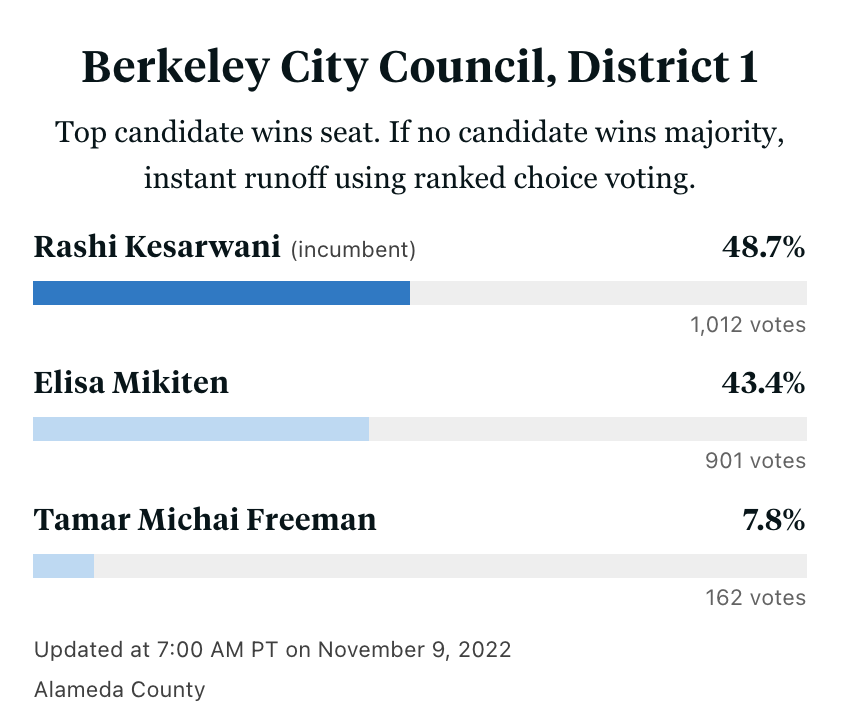
That's our way of saying the race is too close to call and that the result could hang on how the voters who chose the other candidate in the race, Tamar Michai Freeman, directed their second- and third-choice votes. Freeman got 7.8% first-choice votes, and about two-thirds of those ballots named Mikiten as the second choice. Alameda County officials say no updated results will be announced until Thursday.
On Berkeley's three other City Council races: Incumbents Kate Harrison (District 4) and Rigel Robinson (District 7) ran unopposed. In District 8, attorney Mark Humbert leads Housing Advisory Commission Vice Chair Mari Mendonca 69.4% to 30.6% in a ranked choice contest to replace Councilmember Lori Droste, who did not seek reelection.
Incumbents Lead in BART, AC Transit Board Races, Early Results Show
Here's an official KQED day-after-the-election fun fact: There are only three elected transit boards in the United States, and two of them are right here in the Bay Area.
We won't be reporting results from Denver's Regional Transportation District elections, but we do have numbers for the one contested BART board seat and three contests for the AC Transit board of directors:
BART District 6: One-term incumbent Liz Ames leads after election night vote counting with 48.9% of the vote. Challengers Lance Nishihira and Shyam Chetal have 30.7% and 20.4% respectively. There are likely tens of thousands of votes left to count. So far, 25,000 votes have been tabulated in the race. About 87,000 votes were cast in the District 6 contest when Ames was first elected in 2018.
AC Transit at-large seat: Incumbent Joel Young leads Berkeley Planning Commission member and designer Alfred Twu 61.3% to 38.7% in returns from Alameda and Contra Costa counties. Young's 2018 contest drew a total of about 390,000 votes; 134,000 ballots have been counted so far in the 2022 contest.
AC Transit Ward 3 (Alameda-Oakland-San Leandro): UC Berkeley transportation planner Sarah Syed leads Stewart Chen, president of the Oakland Chinatown Improvement Council, by 64.6% to 35.4%.
AC Transit Ward 4 (Castro Valley-Hayward): Murphy McCalley, a retired transportation consultant appointed to the vacant Ward 4 seat earlier this year, is ahead of Barisha Spriggs, a teacher and former union organizer, by 65.3% to 34.7%.